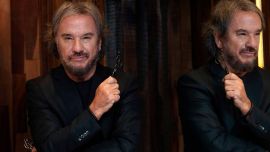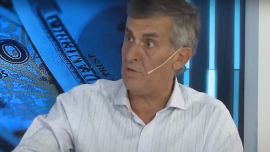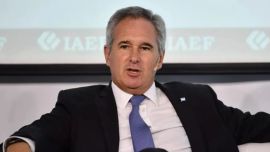A legislative crisis that threatened the presidency of Honduras' first woman President Xiomara Castro, was resolved on Monday after rebel lawmaker Jorge Calix signed a deal to withdraw his claim to be speaker of Congress.
Calix had led a band of 17 dissidents from leftist Castro's Libre party who refused to honour a pre-election agreement that helped the wife of former president Manuel Zelaya earn a history-making victory last November.
The presidential candidate of a rival party – Salvador Nasralla – agreed to withdraw his bid and support Castro in return for the position of vice-president if she won.
But he also wanted a member of his Saviour Party of Honduras (PSH) – Luis Redondo – to be speaker of Congress.
In the lead-up to Castro's inauguration, Calix complicated matters as 17 dissidents and the right-wing opposition elected him as the head of Congress in a parallel session while the rest of the Libre party voted in Redondo, sparking the crisis.
"Even though at one time we did not share the planned strategy ... we are prepared to respect the decision to support deputy Luis Redondo Guifarro to preside over the board of directors of the National Congress in compliance with our president's mandate," said the agreement signed by Zelaya, who is the Libre party coordinator, Calix and the other rebels.
Describing himself as a loyal servant, Calix said he was signing the deal not for his own political career but because it was "what is best for the Honduran people at this time."
The right-wing National Party (PN) opposition "celebrated" the agreement but proposed that a new legislative vote be held to elect Redondo.
Libre is the single largest party in the 128-seat Congress but with 50 legislators does not enjoy a majority.
In fact, the right-wing PN (44 seats) and Liberal (22) parties – traditional opponents that long dominated Honduran – make up more than half of Congress.
Amnesty
Castro, who came to power promising to fight corruption, granted amnesty last Saturday to many officials who served in her husband's government more than a decade ago. Zelaya was president from 2006-2009 until he was ousted.
The measure was approved on Thursday by the legislature led by Redondo and published Saturday in the Official Gazette, which gave it force of law.
The move drew criticism, even from her new special advisor on transparency.
The unconditional amnesty is for officials who served in her husband's government and those who were imprisoned for demonstrating against the re-election of President Juan Orlando Hernández in 2017. He was Castro's predecessor in office.
Zelaya was overthrown in 2009 by a civic-military alliance, which questioned his closeness to Venezuela's socialist government.
Anti-corruption activists have claimed Castro's pardons could cover the past deeds of people who engaged in corruption.
Positive for Covid
It's been a busy few days for Casto, who announced on Sunday that she was infected with Covid-19 but will continue working remotely.
"The result of the PCR [test] yesterday [Saturday] was negative, today's is positive," the 62-year-old president announced on her Twitter account.
"According to the tests it is mild. With the blessing of the Creator of the universe, I continue to follow my Plan of Government to return to democratic and constitutional order," she added.
The president is vaccinated against the virus, Zelaya told AFP.
Castro carried out public engagements last week, participating on Tuesday and Thursday in the celebrations for the 275th anniversary of the apparition of the Virgin of Suyapa, in the basilica in the east of Tegucigalpa.
At the presidential palace, she swore in ministers and other officials and received a visit from boxer Teofimo López, born in New York of Honduran parents.
More than 40,000 people in Honduras have been infected with Covid-19 and more than 10,500 have died from the disease.
– TIMES/AFP























Comments